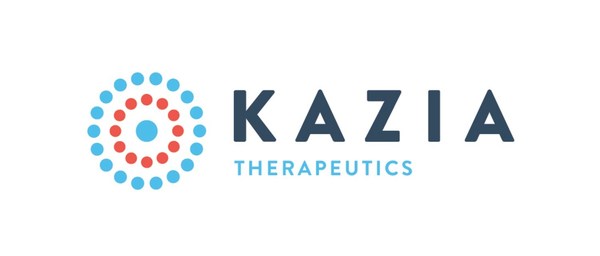 |
SYDNEY, June 3, 2022 /PRNewswire/ -- Kazia Therapeutics Limited (NASDAQ: KZIA; ASX: KZA), an oncology-focused drug development company, is pleased to announce final data from its phase II study of paxalisib as first line therapy in patients with glioblastoma (NCT03522298).
The data is the subject of a poster presentation at the Annual Meeting of the American Society for Clinical Oncology (ASCO), which is being held in Chicago, IL, from 3-7 June 2022.
Key Points
Kazia CEO, Dr James Garner, added "The new data presented today at ASCO provides a more complete picture of trial, and also includes some informative sensitivity analyses. In the mITT population, which excludes non-evaluable patients, survival improves from 15.7 months to 15.9 months. Using the more precise mRANO criteria, PFS improves from 8.4 to 8.6 months. The directionality of these analyses gives us greater confidence in the efficacy signals observed and appear encouraging for future development. We are immensely grateful to the investigators and patients whose hard work and engagement has ensured the success of this trial."
Summary of Paxalisib Data in Comparison to Temozolomide (existing standard of care)
Temozolomide |
Paxalisib (Phase II Study) |
|
Progression-Free Survival (PFS) Measures ability of a drug to slow growth of a tumour |
5.3 months |
8.4 months (RANO) 8.6 months (mRANO) |
Overall Survival (OS) Measures ability of a drug to prolong life |
12.7 months |
15.7 months (ITT) 15.9 months (mITT) |
Clinical Trial Design
The phase II study of paxalisib was an adaptive trial, conducted in two stages. The first stage sought to determine the most appropriate dose in newly diagnosed patients. The second stage was intended to provide additional information on dosing and to seek a preliminary efficacy signal in order to de-risk transition to a larger, pivotal study.
Consistent with these objectives, the primary objective of the study was to evaluate the safety and tolerability of paxalisib in patients with newly diagnosed glioblastoma. The secondary objectives included typical pharmacokinetic parameters, and efficacy endpoints including overall survival (OS) and progression-free survival (PFS).
The phase II study was conducted in 30 patients at six centres in the United States. It was a single arm study in which all patients received paxalisib as a monotherapy. As such, all data must be interpreted in the context of historical comparators. Specifically, Kazia has referred to the pivotal study of temozolomide, the only existing FDA-approved drug for this patient population. Such comparisons are always inexact, and this study was not designed either to precisely quantify the benefit associated with paxalisib or to demonstrate statistical significance. Rather, these are among the objectives of the ongoing GBM AGILE pivotal trial.
Summary of Abstracts
POSTER SESSION – Central Nervous System Tumors
June 5, 2022 – 8am
Abstract 2047 - Paxalisib in patients with newly diagnosed glioblastoma with unmethylated MGMT promoter status: Final phase 2 study results.
PY Wen, J de Groot, JD Battiste, SA Goldlust, D Damek, JS Garner, J Friend , J Simpson, A Olivero, T Cloughesy.
The poster presentation can be accessed here.
About Kazia Therapeutics Limited
Kazia Therapeutics Limited (NASDAQ: KZIA; ASX: KZA) is an oncology-focused drug development company, based in Sydney, Australia.
Our lead program is paxalisib, a brain-penetrant inhibitor of the PI3K / Akt / mTOR pathway, which is being developed to treat glioblastoma, the most common and most aggressive form of primary brain cancer in adults. Licensed from Genentech in late 2016, paxalisib commenced recruitment to GBM AGILE, a pivotal study in glioblastoma, in January 2021. Seven additional studies are active in various forms of brain cancer. Paxalisib was granted Orphan Drug Designation for glioblastoma by the US FDA in February 2018, and Fast Track Designation for glioblastoma by the US FDA in August 2020. In addition, paxalisib was granted Rare Pediatric Disease Designation and Orphan Designation by the US FDA for DIPG in August 2020.
Kazia is also developing EVT801, a small-molecule inhibitor of VEGFR3, which was licensed from Evotec SE in April 2021. Preclinical data has shown EVT801 to be active against a broad range of tumour types and has provided compelling evidence of synergy with immuno-oncology agents. A phase I study commenced recruitment in November 2021.
For more information, please visit www.kaziatherapeutics.com or follow us on Twitter @KaziaTx.
This document was authorized for release to the ASX by James Garner, Chief Executive Officer, Managing Director.
Forward-Looking Statements
This announcement may contain forward-looking statements, which can generally be identified as such by the use of words such as "may," "intend," "potential," "prospective," or other similar words. Any statement describing Kazia's future plans, strategies, intentions, expectations, objectives, goals or prospects, and other statements that are not historical facts, are also forward-looking statements. Such statements are based on Kazia's expectations and projections about future events and future trends affecting our business and are subject to certain risks and uncertainties that could cause actual results to differ materially from those anticipated in the forward-looking statements, including risks and uncertainties associated with clinical trials and product development and the impact of global economic conditions. These and other risks and uncertainties, are described more fully in Kazia's Annual Report, filed on form 20-F with the SEC, and in subsequent filings to SEC. Kazia undertakes no obligation to publicly update any forward-looking statement, whether as a result of new information, future events, or otherwise, except as required under applicable law. You should not place undue reliance on these forward-looking statements, which apply only as of the date of this announcement. Actual results could differ materially from those discussed in this announcement.
[1] ME Hegi et al. (2005) N Engl J Med. 352:997-1003
![]() View original content to download multimedia:https://www.prnewswire.com/news-releases/kazia-presents-positive-final-data-from-phase-ii-study-of-paxalisib-in-newly-diagnosed-glioblastoma-at-asco-conference-301560749.html
View original content to download multimedia:https://www.prnewswire.com/news-releases/kazia-presents-positive-final-data-from-phase-ii-study-of-paxalisib-in-newly-diagnosed-glioblastoma-at-asco-conference-301560749.html